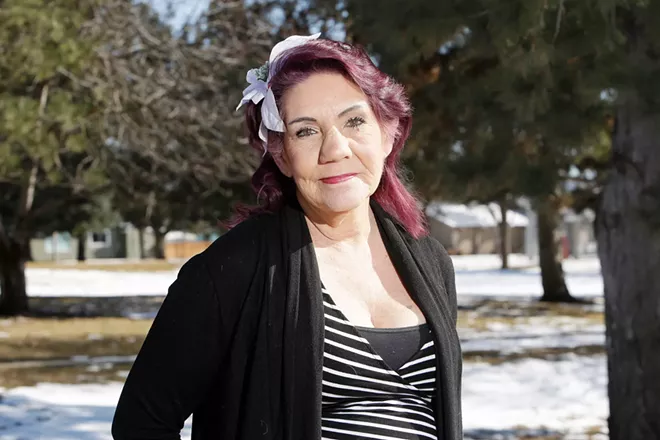Qualified for a housing voucher? Good luck finding somewhere to rent | Local News | Spokane | The Pacific Northwest Inlander
[ad_1]
Young Kwak photo
People like Deborah Cooper-Anderson know that having a housing voucher doesn’t guarantee you can get housed.
One night during the late February Arctic cold snap, Deborah Cooper-Anderson found herself shuffling through the snow as fast as she could with her walker. But by the time she could step up on the curb, she says the bus she was headed toward — the last one of the night — drove away.
Suddenly, the 64-year-old was faced with the scary reality that she might be stuck outside in single-digit weather for the night.
For many homeless people, missing a bus or missing the window of time when shelters accept people for the night can mean just that: spending a night on the streets.
Luckily, Cooper-Anderson says she was able to call the safe house she’s staying at with other domestic violence survivors, and they offered to send someone to get her.
All told, it’s been about five years since Cooper-Anderson was in a stable housing situation.
At that time, she was living in a Spokane Valley house she could afford with the help of a Section 8 housing choice voucher from the federal government. The voucher required that she pay a third of her $900-per-month income (which comes from Social Security disability) toward rent, with the voucher covering the remainder of the monthly cost.
She lived there for two years, but then her landlord said they needed the house back so a relative with medical issues could move in.
Initially, Cooper-Anderson says she wasn’t worried about finding another place. But she quickly found that, even five years ago, it was hard to find a vacant rental that fit her budget — even with the voucher.
During her last few months in the house, not only did she have to find storage for her belongings and search for a new place to live, but she says her mother died in Seattle and she had to go take care of her burial.
Then time ran out. She kept looking, but ultimately she lost the voucher and became homeless.
“I bought three vehicles with the money I got from the death benefit,” Cooper-Anderson says, noting the vehicles barely ran. “I parked them in different places so I’d never be stuck without a roof over my head.”
Over the next four-and-a-half years or so, she’d spend time living in and out of those cars, staying with boyfriends and friends, staying in homeless shelters, and trying to survive on the street.
She says she suffered medical issues, including multiple strokes, but she continued looking for options. So when the Spokane Housing Authority announced it would release another 200-plus vouchers a few months ago, Cooper-Anderson was on top of it.
She told her housing counselor at Hope House about the new vouchers and set to work getting a new social security card and gathering the necessary information.
Luckily, she was able to secure a voucher.
But just because the government says it will help you pay the rent doesn’t mean a landlord will rent to you.
While landlords are not legally allowed to discriminate based on where someone’s income comes from, it definitely happens, explains Zoe Hjelm, a diversion specialist with SNAP’s homeless services team.
“Unfortunately, there’s a stigma attached to folks who have vouchers,” Hjelm says. “If they want to take legal recourse, we have to prove the landlord is saying no because of vouchers … a lot of folks don’t want to pursue that. It’s time consuming, and they just want to get into housing.”
The Department of Housing and Urban Development recently authorized the Spokane Housing Authority to offer landlord incentives, such as $500 to $1,000, just for agreeing to rent to someone with a voucher. Other ideas include offering small repair grants, additional security deposits and more. But those incentives likely won’t start being offered until 2023, according to housing authority staff.
In the meantime, applying for openings can be hard for people like Cooper-Anderson who don’t have computers and struggle to repeatedly get help paying $45 background check fees with applications.
Cooper-Anderson says she recently applied for a downtown apartment and continues looking for listings with a bathtub, as soaking helps with pain from her medical issues and keeps her mobile.
“I worked hard to get my voucher, and I’ve been out there for a long time trying to beat the streets and find a place. I mean, I’ve walked miles,” Cooper-Anderson says. “I’m on the phone all the time; I check every day. It just… it wears on you.”
For much of her life, Cooper-Anderson says she worked as a caregiver, first for her brother who was quadriplegic, and later for other clients with disabilities and her grandfather. But years ago she broke her back, and after trying to keep jobs for several more years, she says she finally realized she wouldn’t be able to work anymore.
“I did everything right. I worked all my life — I raised kids,” Cooper-Anderson says. “I’ve worked harder being homeless than I ever have taking care of people all my life. … I’m scared all the time. I don’t know which way to go to get another place.”
Around New Year’s, before she secured a spot in the safe house, Cooper-Anderson says she checked out of Hope House and went to see what the emergency warming shelter at the Spokane Convention Center was like for the night.
“Because I wanted to know how far off I was from being really homeless, I guess,” she says. “At any moment we can be back out there.”
She’s still working to find housing.♦
[ad_2]
Source link








:max_bytes(150000):strip_icc()/GettyImages-559025517-2000-b3bece30a9074ec3958a4d39f69f2a79.jpg)
